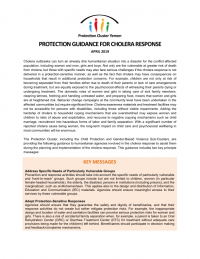Protection guidance for cholera response, April 2019
Cholera outbreaks can turn an already dire humanitarian situation into a disaster for the conflict-affected population, including women and men, girls and boys. Not only are the vulnerable at greater risk of death from cholera, but those with specific needs may also face serious challenges if the cholera response is not delivered in a protection-sensitive manner, as well as the fact that cholera may have consequences on households that result in additional protection concerns. For example, children are not only at risk of becoming separated from their families either due to death of their parents or lack of care arrangements during treatment, but are equally exposed to the psychosocial effects of witnessing their parents dying or undergoing treatment. The domestic roles of women and girls in taking care of sick family members, cleaning latrines, fetching and handling untreated water, and preparing food, means that women and girls are at heightened risk. Behavior change campaigns at the community level have been undertaken in the affected communities but require significant time. Cholera awareness materials and treatment facilities may not be accessible for persons with disabilities, including those without visible impairments. Adding the hardship of cholera to household coping mechanisms that are overstretched may expose women and children to risks of abuse and exploitation, and recourse to negative copying mechanisms such as child marriage, recruitment into hazardous forms of labor and family separation. With a significant number of reported cholera cases being women, the long-term impact on child care and psychosocial wellbeing in most communities will be enormous.
https://reliefweb.int/report/yemen/protection-guidance-cholera-response-april-2019


